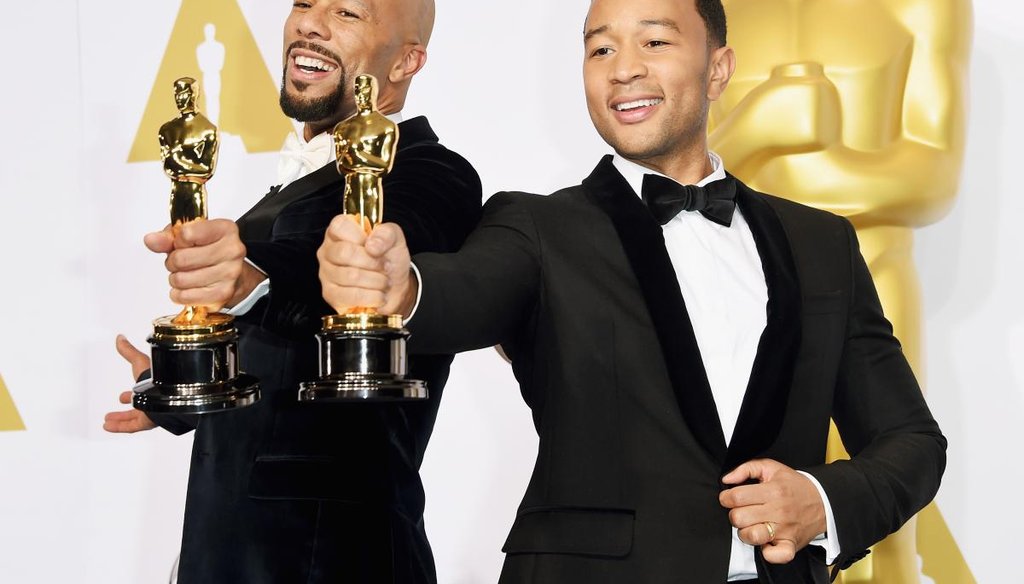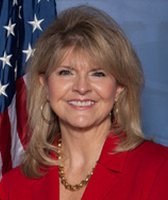Stand up for the facts!
Our only agenda is to publish the truth so you can be an informed participant in democracy.
We need your help.
I would like to contribute

Common (left) and John Legend, winners of the Best Original Song Award for 'Glory' from 'Selma,' pose in the press room during the 87th Annual Academy Awards at Loews Hollywood Hotel on Feb. 22, 2015. (Getty)
And the Oscar for Best Real Talk in an Acceptance Speech goes to ...
Actually, that’s a tough one. Some of Sunday’s Oscar winners issued sincere pleas for wage equality, suicide prevention and calling your parents, not to mention lingering racial injustice 50 years after the civil rights movement.
Musicians John Legend and Common left the audience with a tear-inducing performance of their Oscar-winning Selma anthem "Glory" and then a powerful message about setbacks for black Americans in voting rights, police relations and imprisonment.
"We know that right now the struggle for freedom and justice is real. We live in the most incarcerated country in the world," Legend said. "There are more black men under correctional control today than there were under slavery in 1850."
Readers quickly asked PunditFact to look into Legend’s claims. We can report they are largely accurate.
Sign up for PolitiFact texts
As for the first claim, that the United States is "the most incarcerated country in the world," we turned to the London-based International Centre for Prison Studies, which experts say is the best resource for comparing worldwide prison statistics.
According to the group, the United States has the biggest prison population in the world in terms of raw numbers, with 2.23 million prisoners at the end of 2012.
Behind the United States is China at 1.7 million inmates, then Russia at 671,700, Brazil at 581,500, and India at about 412,000.
China’s prison population could very well be higher. Chinese government officials reported in 2009 that more than 650,000 people were being held in detention centers around China on top of the count for sentenced prisoners. If that number was the same in mid 2013, the total prison population would be more than 2.35 million in China, pushing it above the United States.
But we can’t settle that possibility here.
Experts also said to look at prison populations as a share of the national population.
By that measure, the United States’ prison population (707 prisoners per 100,000 population) exceeds countries around its size, including China. But according to the latest data, it ranks second -- not first -- worldwide. That distinction goes to the tiny nation of Seychelles, which posts the highest rate of 868 prisoners per 100,000 population based on the most recent data.
Peter Wagner, executive director of the Prison Policy Initiative, said he would not ding Legend for not accounting for Seychelles. The countries are not at all in the same league.
Seychelles is a group of African islands in the Indian Ocean northeast of Madagascar and is home to just over 90,000 people. For perspective, the least populous U.S. state is Wyoming with more than 580,000 residents.
The addition of 240 Seychellois from 2012 to 2014 into an already small prison population dramatically pushes the rate from 707 prisoners per 100,000 population to 868, overtaking the United States.
"I think countries that small are just not comparable," Wagner said, adding that his group’s 2014 States of Incarceration report filtered out countries with less than a half-million residents.
Maybe so, but it is a point at least worth noting. So that claim rates Mostly True.
Legend’s also compared black men in the prison system to those enslaved in 1850. He’s right in terms of raw numbers.
Our colleagues PolitiFact Rhode Island fact-checked a nearly identical claim in December from a Brown University student highlighting disproportionate arrest rates of minorities for drug offenses and rated it True.
There were more than double the number of African-American men under state and federal criminal justice supervision in 2013 as male slaves in 1850 — about 1.68 million black male prisoners compared to about 873,000 slaves, according to the Census of 1850.
The claim isn’t as solid, however, if you adjust for the share of the black population, which has grown substantially, along with the U.S. population, since 1850. There were 3.6 million black men and women in 1850 and 42 million in 2010, according to the Census. As Vox.com pointed out, that means a much larger proportion of the country’s population of black men was enslaved in 1850 than is under modern-day "correctional control."
Our Sources
See fact-checks.




































